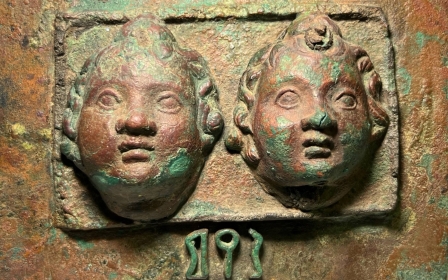Arabic press review: Kuwait expels over 25,000 expats this year

Kuwait expels over 25,000 expats
Authorities in Kuwait have issued deportation orders to around 25,000 expats since the start of 2023.
The figures amount to around 108 people being expelled per day, according to a report published by Kuwaiti newspaper Al Qabas.
According to a Kuwaiti security source, the expats have been deported on the basis of administrative decisions over various violations.
Some of the most common violations include involvement in narcotics abuse, begging, committing acts that harm the security of the country and violation of residence and labour laws.
Stay informed with MEE's newsletters
Sign up to get the latest alerts, insights and analysis, starting with Turkey Unpacked
The security source added that around “10,000 women have transgressed the law and committed violations”.
The report also stated that the Kuwaiti Ministry of Interior has drawn up plans to clamp down on around 100,000 people who are violating the laws and are in hiding, and that an “intensive campaign will be launched in the coming days to seize them”.
Earlier this year, Al Qabas reported that the Ministry of Interior is working with the Labour Authorities to implement a campaign to deport any expats who are breaking the law.
According to official government statistics, there are around 133,000 people in breach of residency laws in the country.
Soft drinks disappear from shelves in Tunisia
Soft drinks are the latest items in short supply in Tunisia, amid an ongoing food and economic crisis, according to the London-based Al-Araby Al-Jadeed newspaper.
The shortage of soft drinks comes amid peak tourist season and soaring temperatures.
Tunisia's syndicate of soft drinks manufacturers announced that the limited production is due to a lack of raw materials and malfunctions with equipment in factories.
Saad Mazah, head of the National Chamber of Soft Drink Producers, said that supplies had been held up by delays in fixing issues with the gas plant used to make the drinks.
Instead, Tunisia has been forced to search for international suppliers, including from Algeria and Egypt.
Some soft drink factories have been closed for weeks as they struggle to get hold of raw materials and operate their machinery daily.
Other products in short supply are sugar, coffee, rice and flour. There has also been a disruption in the supply of fuel. However, officials deny these claims.
Egypt delays release of detainees
Egypt is refusing to release detainees despite issuing a decision to release them, according to reports in the London-based Al-Quds Al-Arabi newspaper.
The Egyptian Network for Human Rights said that security services are yet to release a number of prisoners.
“Despite a decision being released six days ago to free 40 prisoners of conscience, families are complaining that they have not yet been let go,” the network said in a statement.
A member of Egypt’s Presidential Pardon Committee, Tariq al-Khouli, published the names of 30 political prisoners on 19 August who are set to be released. They were held in pre-trial detention on charges relating to “issues of publishing and joining a banned group”.
The decision to release them gave hope to many families over the release of their loved ones. However, within hours of the decision to release the prisoners, authorities arrested a group of new people, according to Al-Quds Al-Arabi.
The most prominent of those arrested during the past few days is the publisher Hisham Qassem, head of the Board of Trustees of the Free Movement.
Many expressed their solidarity with Qassem, after he was transferred to the Tenth of Ramadan Prison in Cairo, in preparation for his trial on 2 September on charges of "insulting and slandering a former minister".
Others arrested include journalist Mohamed Saad Khattab, the father of activist Ahmed Gamal Ziada, and Alaa el-Din Saad el-Adly, the father of political activist Fajr el-Adly.
*Arabic press review is a digest of news reports not independently verified as accurate by Middle East Eye.
Middle East Eye delivers independent and unrivalled coverage and analysis of the Middle East, North Africa and beyond. To learn more about republishing this content and the associated fees, please fill out this form. More about MEE can be found here.





.jpg.webp?itok=Xab_yozK)